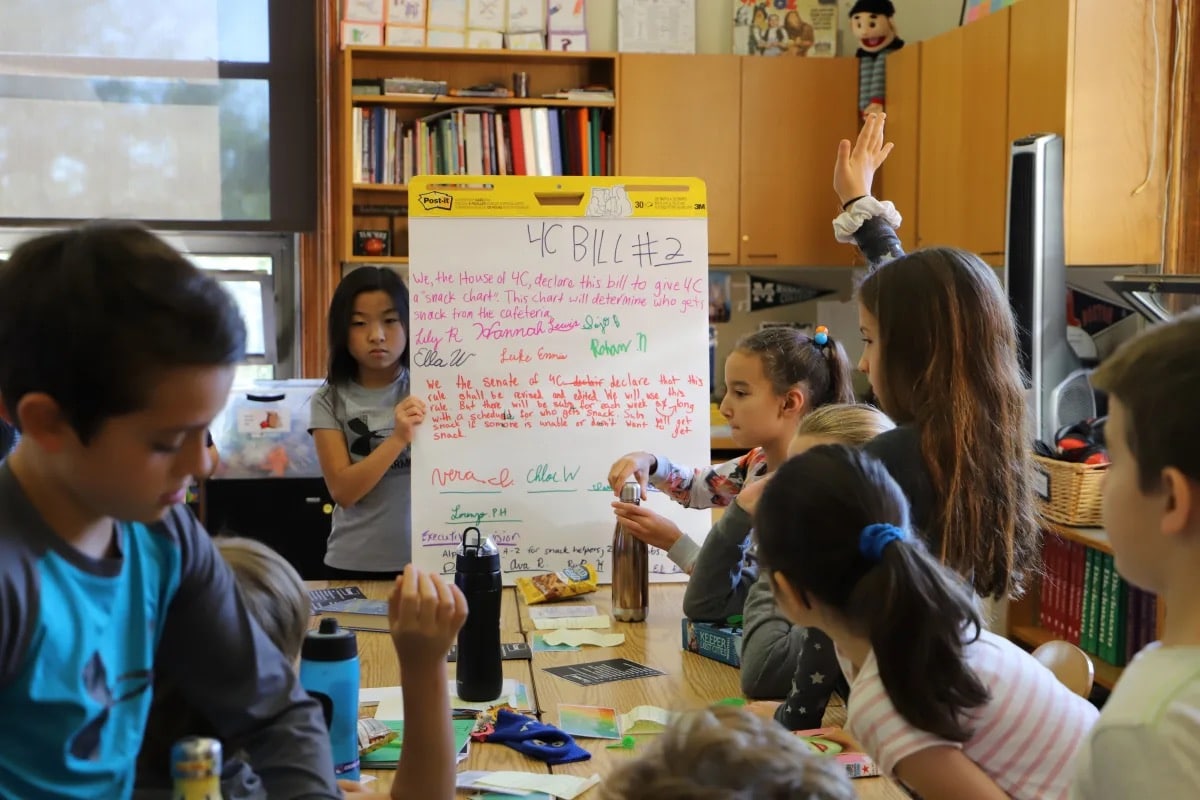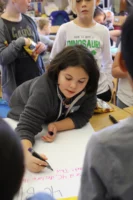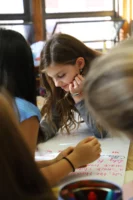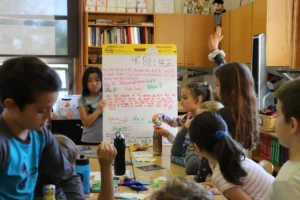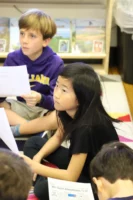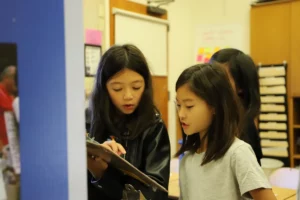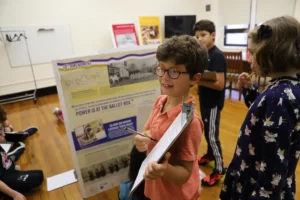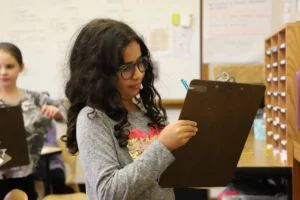The House is in session. In hushed but anxious tones, Representatives set aside partisan differences in their race to pass a bill over to the Senate. Fifteen minutes later, a draft is ready, and the Speaker of the House stands before her colleagues to present the bill.
The measure up for consideration? Who gets to bring down snacks from the 6th Floor Cafeteria each morning.
In Danny Crawford’s 4th Grade classroom, students are fully immersed in their simulation of the three branches of government. The brainchild of one of Crawford’s 4th Graders, the stimulation is testament to students’ eagerness to engage critically and creatively with their learning.
In their roles — as Representatives, Senators, Supreme Court Justices, and Cabinet members who sit alongside Crawford, the President — they experience the twists and turns of policymaking firsthand. Questions of justice, equity, and efficiency arise: If we rotate snack duties based on alphabetical order, isn’t that unfair to people like Chloe W., whose last name is near the end of the alphabet? Aren’t we all mature enough to decide among ourselves who should get snacks?
Because the study of the U.S. government is a mainstay in primary education systems across the country, the unit has developed a reputation for mundanity. At Ethical Culture, however, 4th Graders examine the three branches of government, the Constitution, and its amendments through a combination of student-driven role play and critical inquiry, making a “dull” unit anything but.
Three weeks earlier, Lily R. ’28 had an idea. Crawford was wrapping up the class’s study of the three branches of government, and she wanted to bring the U.S. government to life.
After consulting with some friends, Lily approached Crawford with the names of her classmates already assigned to different roles. Crawford asked her what she wanted to do with the list: A mock trial? A vote on impeachment? Lily returned with the idea to draft a new classroom policy, and by Friday, the first session of the First Congress of 4C was underway.
Crawford is struck by how well this simulation exemplifies the Ethical Culture Fieldston School’s model of progressive education. It’s exciting to witness a project that allows students to learn in a playful, hands-on setting; what’s even more impressive is that a student was inspired to devise the project herself.
In its first legislative session, the 4C Congress attempted to rewrite the consequences for misbehaving in class. A draft bill went through several iterations, President Crawford returning it to Congress with his revisions, the House and the Senate overriding the revisions with a two-thirds majority vote. Ultimately, the bill sank when eight out of nine justices found that it violated the class policy of having fun. This time, when it comes to snack duties, the class is hoping to push through real reform.
Liba Bronstein-Schwartz and Sammy Seif’s 4th Grade class is assembled around a five-foot-tall pop-up display, the most prominent object in the room. It presents an overview of the fight for women’s right to vote in America, including historical events, quotes from suffragists, and reproductions of primary documents. The display is a miniature version of Rightfully Hers, an exhibition curated by the National Archives Museum to commemorate the 100th anniversary of the passing of the 19th Amendment.
“We’ve never focused on the 19th Amendment,” Bronstein-Schwartz says, as her students jostle around the display, scribbling notes on clipboards. “We’ve always focused on the 1st [Amendment], so this is a new addition.”
As part of their ongoing commitment to diversity, equity, and inclusion education, the 4th Grade team has sought to examine the 19th Amendment more critically. It’s commonly accepted that the 19th Amendment gave women the right to vote — but only some women could in fact vote. As the Rightfully Hers poster points out, and as Bronstein-Schwartz and Seif reiterate, discriminatory measures, language barriers, and lack of access to citizenship precluded many black, Latinx, Asian, Native American, and immigrant women from voting. While it’s easy to celebrate the amendment as a step forward for gender equality, the 4th Grade teachers at ECFS want to remind students to think about the groups that remained disenfranchised in spite of the new law.
Meanwhile, Jen Keith’s 4th Grade class is reading through the 11th–27th Amendments, covering every revision to the Constitution since the passing of the Bill of Rights. As Keith goes through the amendments, students chime in with the many bits of knowledge they know. The 21st Amendment, reversing the ban on alcohol under Prohibition. (“Wasn’t this during the Great Depression?” Sophie Y. ’28 asks.) The 22nd Amendment, preventing the President of the United States from seeking a third term in office (“That’s why Obama couldn’t,” Charlie S. ’28 pipes up.)
When Keith reaches the 23rd Amendment, which grants citizens living in the District of Columbia the right to vote in a presidential election, some students express confusion. Does that mean people in D.C. couldn’t vote before? Keith nods.
There’s a pause as the class considers what it means to be deprived of the right to vote.
Back in Crawford’s classroom, a bill establishing a “snack chart” has received the blessing of both the House and the Senate. With one revision from the President and his Cabinet, it’s signed into law. In this simulation, what remains is for the Supreme Court to rule on the law’s constitutionality.
It’s not whether we like it or not. It’s whether it’s constitutional.
One of the Justices believes the new policy is unfair; a couple find it superfluous. But, as Asher S. ’28 reminds his classmates, “It’s not whether we like it or not. It’s whether it’s constitutional.” The Justices cast a vote, and Crawford reads out their opinions: yes, no, yes, no, yes, no, yes… yes. Cheers erupt throughout the classroom.
With that, the new snack policy is added to the classroom rules, and ECFS’ newest lawmakers score a victory for the class.
No matter which Amendments of the Constitution they come into class knowing, how deeply they’ve thought about discrepancies in voting rights, or even where they stand on the distribution of snacks, all of our 4th Graders come away with the same things: an appreciation for the complex ways our government works, and an eagerness to participate as engaged citizens.
